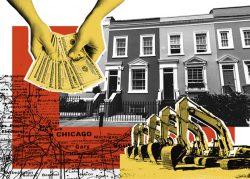Home values in Chicago are rising faster in predominantly Black neighborhoods, driven in part by investors buying homes to flip or turn into rentals.
While home values in the city’s Black neighborhoods have almost doubled from their post-Great Recession lows, home prices in mostly white areas remain well above those of communities of color, though they have appreciated more modestly. The share of purchases by investors was three times greater in Black neighborhoods than in majority-white areas, according to DePaul University’s Institute for Housing Studies.
Record-low interest rates and soaring home prices allowed homeowners to refinance, taking cash out of their homes and lowering monthly costs. White homeowners were better able to benefit because of the higher home prices in their neighborhoods. Owner-occupied households in Chicago’s predominantly Black neighborhoods fell 13.6 percent between 2010 and 2019 – the only racial group to record a decline in the period – while it increased slightly in the city’s white and Hispanic areas, according to DePaul.
“There is still a substantial and growing gap between homeowner rates of Black households and white households,” said Geoff Smith, executive director of DePaul’s Institute for Housing Studies. “On the new homeowner’s side, I think the big barrier is affordability and inventory in a lot of places.”
Drops in the share of homeowners across Chicago and the country during the pandemic were more dramatic for Black people than others, threatening to erase progress made in the two years before the health crisis. In the year just before the pandemic, from mid-2019 to mid-2020, the national share of Black homeowners rose by more than six percentage points to 47 percent, according to U.S. Census data.
While the rate of Black households that own was still about 30 percentage points behind the nationwide figure for white households, even with the pre-pandemic rally, its upward movement was significant.
“You did also see a substantial increase in the Black homeownership rate that happened right before this price increase. Getting that to move up by more than two percentage points, that’s a big deal. There are people behind these data points,” said Andrew Hanson, an associate professor at the Stuart Handler Department of Real Estate at the University of Illinois at Chicago.
Allowing residents, and not just investors, to capitalize on Chicago’s fastest-growing home prices in predominantly Black and majority nonwhite areas is seen as crucial to narrowing the gap in homeownership – and, in turn, household wealth – between communities of color and white neighborhoods.
Homes in mostly Black areas were initially slower to recover from the Great Recession, then gained steam after investor activity in 2018 slowed through the rest of the city’s neighborhoods where home prices stabilized and foreclosure inventory vanished, according to DePaul.
“As a result, investors are likely to be the primary beneficiaries of recent house price recovery in communities of color instead of owner occupants,” a DePaul report from the fall said.
The National Association of Real Estate Brokers, a Black industry group, has made proposals to prevent that. In its annual report last month, it suggested, among other policies, that Black people be given assistance in making down payments on homes out of a fund established to provide restorative justice to communities of color prevented from building household wealth through residential real estate by discriminatory lending and appraisal practices.
Read more


